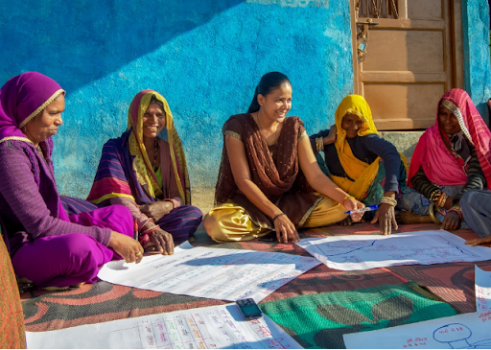Collaborating, Learning, and Adapting for Water Security: Women + Water Alliance wins USAID’s CLA Case Competition
The Women + Water Alliance empowered over 2.3 million people to improve their access to water and sanitation in India. How did they do it? By intentionally incorporating collaborating, learning, and adapting (CLA) into their programming.
As a winner of the 2022 CLA Case Competition, the USAID Gap Inc Women + Water Alliance has some key reflections on its success. The USAID Gap Inc. Women + Water Alliance, which ran from 2017 to 2023, was designed to improve and sustain the health and well-being of women and communities touched by the apparel industry in India. It aimed to empower women to become change agents for sustainable water, sanitation, and hygiene (WASH) services in their communities.
Women +Water Alliance’s CLA Journey
A key aspect of Women + Water from its inception was to adapt programming based on intentional learning. After the first year of implementation, Women + Water facilitated a pause-and-reflect session in which members identified the potential to expand their reach by adjusting the theory of change and implementation approach. For example, the team recognized that empowering a woman to take out a micro-loan for a water tap could not be effective if there is no reliable water supply to draw upon. As a result, Women + Water ensured to push for WASH governance to ensure water was reaching communities and households before behaviors around water usage could change.
Women + Water facilitated a theory of change workshop in 2018 with a broader set of actors and stakeholders in the WASH space, including community representatives and WaterAid. WaterAid’s deep connections with community leaders and strong understanding of India’s water infrastructure needs gave a fresh and knowledgeable perspective that solidified the Alliance’s objectives and invigorated the implementation approach.
In addition to advocating for increased engagements with communities and community leaders, Women + Water prioritized beneficiary feedback to ensure a continuous learning process and rapid adaptive management throughout the remainder of implementation.
Incorporating a CLA culture into Programming and Implementation
Women + Water Alliance’s USAID counterpart Ella Lazarte, Water Finance and Private Sector Lead in USAID’s Center for Water Security, Sanitation, and Hygiene, and Gap Inc. program leaders have been champions of CLA, encouraging and empowering staff to seek innovative solutions whenever possible.
The CLA process enabled Women + Water to bring more evidence-based learning into collaborative discussions with USAID, Gap Inc., partners, and local counterparts. This opened communication channels wider than they otherwise could have been, and aligned all parties. CLA quickly became more fully embedded in the team culture.
Elizabeth Isaac, Director of Research and Programs at the Institute for Development Impact (I4DI), the partnership’s CLA collaborator, gave an example: “The Women + Water Alliance has been very intentional about putting into practice programmatic learning for the purpose of sustainable adaptive management. The mid-term process evaluation identified a series of technical and management shifts that the Alliance could make to maximize program impact and overall results, such as the need to mobilize senior management in-country to establish sustainable relationship-building with the Government of India and other stakeholders. Alliance leadership and senior management were quick to act on these findings, which helped set the stage for the program successes that followed."
Women + Water recommends this intentional, resourced, and championed approach to other activities hoping to internalize CLA approaches for their organizational and development challenges.
By I4DI’s Elizabeth Issac & Micah Frumkin, for the USAID Gap Inc-funded Women + Water Alliance.

About the Author
Elizabeth Issac is I4DI’s Director, Research & Programs. She has a strong background in small and medium enterprise development, trade, and capacity building, with a particular focus on effective project management, monitoring, evaluation, and research. Prior to joining I4DI, Ms. Issac led start-ups, implementation management, and closeouts of $30 million, as well as USAID-funded projects in South and Southeast Asia.

About the Author
Micah Frumkin is I4DI’s Senior Director for Monitoring, Evaluation, Research, and Learning (MERL). He brings 15 years of MERL experience working with a broad range of public and private sector clients across all sectors and geographies. Micah is an expert in applying a systems lens to MERL, working with clients to improve their MEL practices, policies, and approaches in a manner that fits with the culture of their organizations.


